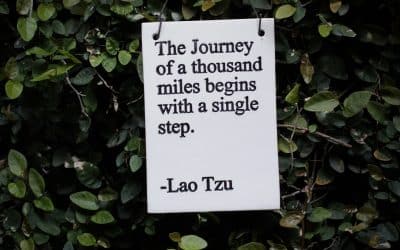Have you ever started a day or a week with a long to-do list, but ended it feeling disappointed that they weren’t achieved? How often have you set goals for your well-being like getting to bed earlier or eating healthier, only to go back to the same old habits?
Everyone wants to be better and do better. And we can all agree that the resistance we feel towards change is real! Many people have the experience of what we called “Psychological Inertia”, meaning we tend to maintain the status quo unless there is an internal motivation strong enough to interfere with it. We like doing things in our default mode as it brings us comfort. While this works for us some of the time, resisting change from undesirable or unhealthy habits can be detrimental to our well-being and our self-esteem.
Reasons for resistance to change
So why we would be reluctant to change for the better?
Here’s an example. Let’s say that you have a hard time speaking up for yourself, and yet find yourself resisting this movement towards being more assertive. Why would that be? Here are a few potential culprits.
1. Lack of awareness of the need for change (“Is there a problem?”)
Sometimes the fundamental barrier is that we don’t challenge our assumptions and ways of behaving or even ask if there is a problem. Less assertive individuals may not see that as a problem but may consider themselves peaceful instead of pleasing. With this mindset, there is a lack of interest in change and no plan or intention to change, as it is not actually seen as a problem.
2. The loss outweighs the benefits (“It’s not worth it for me to change.”)
We can be ambivalent about whether it is worthwhile to change even after we are aware of the problem. Along with our example, people may think they will be creating conflicts when they speak up for themselves. They may expect to complicate relationships with their assertiveness which they see as more important than being congruent. Therefore, they are unsure in deciding to change.
3. An attachment to the old way & fear of the unknown (“I’m used to the way I’m doing things… change is scary.”)
Most people find that change for the better is worthwhile, but may feel uneasy to leave the habit or fearful of what will happen when they change. For example, people who have been people-pleasing over the years simply can’t imagine themselves beyond that self-image. They may also be afraid of change as there will be too many uncertainties. What if people interpret setting boundaries as being selfish or thoughtless? These potential shifts in identity can become too hard to handle.
4. Lack of resources for change (“I don’t know how to get started.”)
People may delay change because they do not know how to do it. Some changes can be self-directed, but many require outside help, new information and skills. If we continue with our example of gaining assertiveness, this change would involve a variety of skills such as self-awareness, appropriate body language, and choice of words. Each skill likely benefits from deliberate practice, and it may act as a barrier for those who are trying to commit to change.
Some tips to make change happen
Despite the resistance, many of the clients we work with ARE successful in personal change. What are they doing differently? Here are some useful strategies to bring about change:
1. Understand the issue
Instead of just saying “I’ll do it”, we find that a deep reflection on the problem facilitates insights into why it is there in the first place. For example, someone who typically does not express their needs, or tends to be a people-pleaser, may think that they should be more assertive. However, assertiveness might be something that was unacceptable or came with consequences in their childhood. Therefore, their submissiveness worked well as an adaptive coping mechanism in the past, but now is starting to cause negative impacts in their adult life. Embracing the history of your issue fosters self-acceptance and lets you have a starting point for the next step. You will be more aware of WHY you have been moving through life in this way, the barriers to change, and the thoughts and feelings associated with the issue as well.
2. One step at a time
Choose one small goal at one time, but a feasible one. Set SMART goals (Specific, Measurable, Attainable, Realistic, and Timely). Progress is important no matter how trivial it is, and remember that slow is fast. Find a balance between an attainable goal and a meaningful one. If a goal is very attainable, sometimes it does not feel significant enough; on the other hand, if a goal is very meaningful, it may not be attainable. See what we mean?
3. Build an accountability circle
Set up an ‘accountability circle’ of a few trusted friends, colleagues, or family members who are able to see you in action and who would be willing to offer you honest feedback on what they observe. Tell them your goal and what you are going to do to achieve that. Ask for their feedback on how you are doing. They can also be a companion to you in your actions like supporting you in scenarios where you need to speak up. This may be a tough sell, but it can be a really great source of information and motivation.
4. Journaling
Having a record of your actions and progress helps to facilitate our learning and process as we go, and journaling can keep your experience organized. You can review and monitor your progress, and you will more easily be able to notice any changes. This process can also promote motivation, which of course allows you to then focus on your next steps.
5. Celebrate your success
We need to acknowledge our everyday wins, not just the bigger ones that happen less often. No win is too small to celebrate. So be grateful to yourself for every step in your change process, as it will build momentum and confidence.
6. Expect setbacks & re-evaluate your goals
Setbacks are common and you do not need to beat yourself up for them. Be compassionate to yourself and try not to feel discouraged, as they are part of the larger process of change. If setbacks keep happening, then go ahead and re-evaluate your goals and adjust them accordingly if they are too high to achieve. You can always try again.
Finally, consider connecting with a professional, such as a coach or counsellor
Let’s normalize the role that counselling can play in facilitating change. We encourage you to connect with us if you have any questions about the process, or if you are ready to get started, you can book online here. One of our skilled therapists will be happy to help with whatever change you are trying to create in your life.




